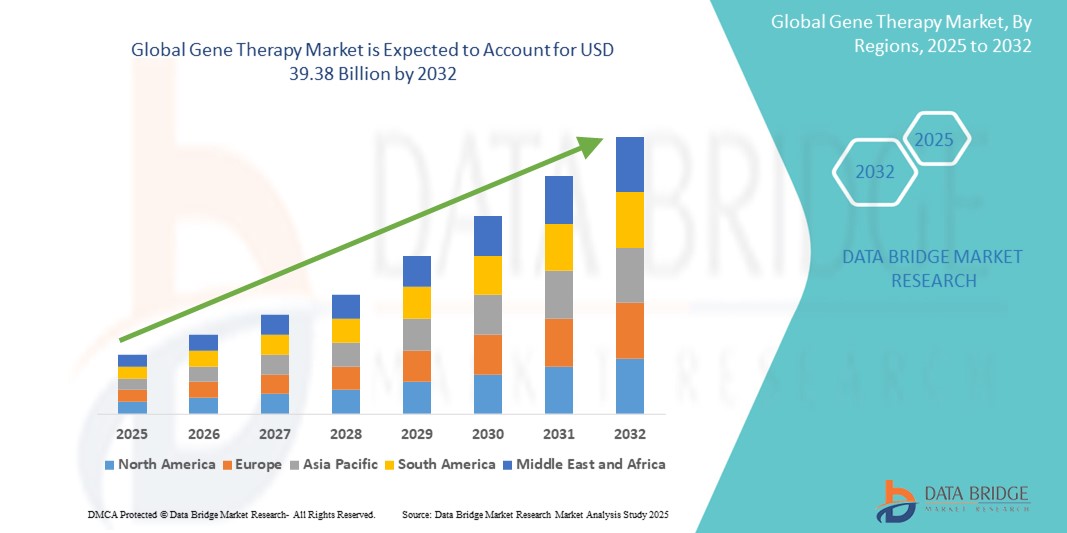Global Gene Therapy Market
市场规模(十亿美元)
CAGR :
% 
 USD
10.26 Billion
USD
39.38 Billion
2024
2032
USD
10.26 Billion
USD
39.38 Billion
2024
2032
| 2025 –2032 | |
| USD 10.26 Billion | |
| USD 39.38 Billion | |
|
|
|
|
全球基因治療市場細分,按載體類型(病毒載體和非病毒載體)、方法(體外和體內)、基因類型(抗原、細胞因子、腫瘤抑制因子、自殺、缺陷、生長因子、受體等)、應用(腫瘤疾病、心血管疾病、傳染病、罕見疾病、神經系統疾病和其他疾病)、最終用戶(癌症研究所、醫院、研究機構等) - 產業研究機構等)
基因治療市場規模
- 2024 年全球基因治療市場規模為102.6 億美元 ,預計 到 2032 年將達到 393.8 億美元,預測期內 複合年增長率為 18.30%。
- 市場成長主要受到對治療療法日益增長的需求和對基因療法研究不斷增加的投資的推動。技術進步,特別是基因編輯和傳遞方法的進步,大大促進了這種擴展
- 此外,遺傳疾病的日益普及和強大的臨床試驗管道使得基因治療成為一種很有前景的治療方式。有利的監管環境也加速了基因治療解決方案的採用,從而顯著促進了該行業的成長
基因治療市場分析
- 基因療法涉及引入、移除或改變個體的遺傳物質以治療或治癒疾病,已成為現代醫學中越來越重要的組成部分,由於其有針對性的方法和改變疾病的潛力,它為遺傳和後天條件下以前無法治癒的遺傳疾病、癌症和傳染病提供了潛在的治療方法
- 基因療法需求的不斷增長,主要源於人們對疾病遺傳基礎的理解不斷加深、基因編輯技術的顯著進步,以及對罕見疾病和慢性病有效治療的需求不斷增長,而傳統療法的效果有限。
- 北美在基因治療市場佔據主導地位,2025 年的收入份額最大,為 40.5%,其特點是強大的研究基礎設施、高昂的醫療保健支出以及領先的生物技術和製藥公司的存在
- 預計亞太地區將成為基因治療市場成長最快的地區,預測期內複合年增長率為 27.2%,這得益於醫療基礎設施投資的增加、遺傳疾病患者人數的增加以及可支配收入的提高,從而支持人們獲得先進的醫療治療
- 預計病毒載體領域將在 2025 年佔據基因治療市場的主導地位,市佔率為 85.5%,這得益於腺相關病毒 (AAV) 和慢病毒等病毒載體在傳遞治療基因方面已得到充分證實的功效和多功能性。這些載體已被廣泛研究並成功用於多種已批准的基因療法
報告範圍和基因治療市場細分
|
屬性 |
基因治療關鍵市場洞察 |
|
涵蓋的領域 |
|
|
覆蓋國家 |
北美洲
歐洲
亞太
中東和非洲
南美洲
|
|
主要市場參與者 |
|
|
市場機會 |
|
|
加值資料資訊集 |
除了對市場價值、成長率、細分、地理覆蓋範圍和主要參與者等市場情景的洞察之外,Data Bridge Market Research 策劃的市場報告還包括深入的專家分析、定價分析、品牌份額分析、消費者調查、人口統計分析、供應鏈分析、價值鏈分析、原材料/消耗品概述、供應商選擇標準、PESTLE 分析、波特分析和監管框架。 |
基因治療市場趨勢
“透過先進的基因編輯和傳遞來增強治療潛力”
- 全球基因療法市場的一個重要且加速的趨勢是與先進基因編輯技術(如CRISPR-Cas9)以及創新基因遞送系統(如腺相關病毒 (AAV) 和非病毒載體)的深度融合。這種技術融合顯著提高了治療介入的精確度、有效性和安全性
- 例如,正在開發基於 CRISPR 的療法,以精確瞄準和糾正鐮狀細胞疾病和β地中海貧血等疾病中的致病基因,從而提供一次性治癒治療的潛力。同樣,AAV 衣殼工程的進步正在改善治療基因向特定組織和器官的標靶遞送,最大限度地減少脫靶效應
- 先進的基因編輯與複雜的遞送機制相結合,實現了高度特異性的基因修飾和目標細胞的有效轉導等功能,從而帶來更有效、更安全的治療方法
- 精準的基因編輯工具與高效的交付平台的無縫整合有助於針對更廣泛的疾病開發更有針對性和個性化的基因療法。透過結合這些技術,研究人員可以設計出針對個別患者獨特基因特徵的治療方法,最大限度地提高治療效果,並最大限度地減少不良反應
- 這種更精確、更有效率、更個人化的基因治療趨勢正在從根本上重塑各種疾病的治療模式。因此,各公司正大力投資開發新型基因編輯工具,以提高準確性和遞送系統,增強組織特異性並降低免疫原性
- 隨著臨床醫生和患者越來越多地尋求變革性和潛在治癒性的治療方案,對無縫整合先進基因編輯和傳遞技術的基因療法的需求在遺傳疾病、腫瘤學和傳染病等各個治療領域迅速增長
基因治療市場動態
司機
“由於遺傳疾病的發病率不斷上升以及對有效治療的需求不斷增長”
- 全球遺傳疾病的發生率不斷上升,加上對有效且可能治癒的治療方法的需求不斷增長,是基因治療需求增加的重要驅動因素
- 例如,2025年5月,多家研究機構宣布了針對杜氏肌肉營養不良症等罕見遺傳疾病的基因治療試驗取得了令人鼓舞的結果,凸顯了這些療法在滿足以前未滿足的醫療需求方面的潛力。預計此類進步將在預測期內推動基因治療產業的成長
- 隨著對各種疾病遺傳基礎的理解不斷深入,以及傳統治療的局限性日益凸顯,基因療法有望解決這些疾病的根本原因,從而提供一種引人注目的替代或更優的治療方案
- 此外,隨著個人化醫療意識的不斷增強以及根據個人基因組成定制治療方案的潛力,基因療法正成為治療一系列疾病(包括癌症和自體免疫疾病)的越來越有吸引力的方法。
- 一次給藥即可獲得持久的治療效果甚至治癒的可能性,以及在基因層面針對特定疾病機制的能力,是推動基因療法在罕見疾病和常見疾病中得到應用的關鍵因素。研發投入的不斷增加,加上製造和交付技術的進步,進一步促進了市場的成長。
克制/挑戰
“對高開發成本和複雜製造流程的擔憂”
- 人們對基因療法研究、開發和製造的高成本的擔憂對更廣泛的市場可及性和滲透性構成了重大挑戰。基因編輯、載體開發和細胞處理的複雜性導致大量的前期投資和持續的生產費用,這引起了付款人和患者對這些治療的可負擔性的擔憂
- 例如,細胞和基因療法的製造過程複雜且通常個人化,可能導致巨大的生產成本和物流障礙,從而影響療法的最終價格
- 透過製造技術進步、規模經濟和創新定價模式來解決這些成本問題對於確保更廣泛的患者獲得治療至關重要。公司正在探索諸如開發更有效的病毒載體生產方法和建立集中製造設施等策略來降低成本
- 儘管人們認識到透過治癒療法可以節省長期成本的潛力,但高昂的初始投資可能會成為採用的障礙,特別是在預算受限的醫療保健系統或缺乏全面保險覆蓋的患者中。臨床試驗的複雜性以及對專業基礎設施和專業知識的需求進一步增加了基因治療開發的總成本
- 透過製造技術創新、簡化監管流程和製定可持續報銷框架來克服這些挑戰,對於充分發揮基因療法的潛力並確保更廣泛的患者群體能夠獲得基因療法至關重要。
基因治療市場範圍
市場根據載體類型、方法、基因類型、應用和最終用戶進行細分
- 依向量類型
根據載體類型,基因治療市場分為病毒載體和非病毒載體。病毒載體領域佔了 85.5% 的顯著市場收入份額,這得益於腺相關病毒 (AAV) 和慢病毒等病毒載體在傳遞治療基因方面已得到充分證實的功效和多功能性。這些載體已被廣泛研究並成功用於多種已批准的基因療法
預計非病毒載體部分將在預測期內見證快速成長率,這得益於脂質奈米顆粒、裸DNA和電穿孔等非病毒遞送系統的不斷進步。這些方法在安全性、免疫原性和攜帶更大遺傳有效載荷的能力方面具有潛在優勢,使其在某些應用方面越來越有吸引力,並克服了與病毒載體相關的一些限制。
- 依方法
根據方法,基因治療市場分為體外治療和體內治療。目前,體內治療領域佔據了較大的市場收入份額,這得益於其在更廣泛的疾病範圍內的適用性以及治療大量患者的潛力。體內方法包括將治療基因直接遞送到患者體內
體外基因治療領域也正在經歷顯著增長,特別是在癌症和某些遺傳疾病的細胞基因治療等領域。該方法涉及修改患者體外的細胞,然後將其移植回去。基因改造的受控環境為特定的治療應用提供了優勢
- 依基因類型
依基因類型,基因治療市場分為抗原、細胞激素、腫瘤抑制因子、自殺、缺陷、生長因子、受體等。缺陷類藥物佔據了最大的市場份額,主要原因是人們專注於治療因缺乏功能性基因產品而導致的遺傳性疾病
腫瘤疾病領域(正在應用,但受腫瘤抑制基因和自殺基因等基因類型方法驅動)預計將出現顯著增長,因為基因療法有可能為各種癌症提供有針對性的、有效的治療。其他基因類型,如抗原(用於疫苗開發)和細胞激素(用於免疫調節)也在各自的應用中促進市場成長。
- 按應用
根據應用,基因治療市場細分為腫瘤疾病、心血管疾病、傳染病、罕見疾病、神經系統疾病和其他疾病。腫瘤疾病領域目前可能佔據最大的市場收入份額,這得益於密集的研究和開發工作以及各種癌症類型中大量未滿足的醫療需求。
預計罕見疾病領域在預測期內將出現顯著的成長率,這得益於對開發罕見遺傳疾病療法的監管支持和激勵措施的增加,以及該領域基因療法所表現出的良好效果。神經系統疾病和心血管疾病等其他應用領域的研究和臨床開發活動也在增加。
- 按最終用戶
根據最終用戶,基因治療市場分為癌症研究所、醫院、研究機構和其他。醫院部門是最大的終端使用者部門,主要原因是醫院直接參與病患治療和已核准的基因療法的管理。
研究機構在基因治療發展的早期階段發揮著至關重要的作用,預計仍將是重要的最終用戶,為新型療法的研發做出貢獻
基因治療市場區域分析
- 北美在基因治療市場佔據主導地位,2024 年的收入份額最大,為 40.5%,這得益於強大的研究基礎設施、高昂的醫療保健支出以及領先的生物技術和製藥公司的存在
- 該地區受益於主要市場參與者、先進的醫療保健基礎設施以及創新醫療技術的高採用率。此外,遺傳疾病和癌症的盛行率不斷上升,加上有利的報銷政策,有助於北美保持強大的市場地位。
- 這項廣泛的活動得到了大量臨床試驗資金、學術機構與產業界合作以及監管機構積極加快有前景的基因療法審批的支持,使該地區成為這些先進療法開發和商業化的領導者
美國基因治療市場洞察
2025 年,美國基因治療市場佔據北美最大的收入份額,市場份額為 63.2%,這得益於強大的生物製藥行業、大量的研究資金以及積極的監管環境。消費者(患者和醫療保健提供者)越來越重視基因療法為各種疾病提供長期或治癒性治療的潛力。遺傳疾病和癌症的發生率不斷上升,加上對創新療法的需求,進一步推動了基因治療產業的發展。此外,基因療法日益融入標準治療方案以及報銷途徑的可用性,大大促進了市場的擴張。
歐洲基因治療市場洞察
預計歐洲基因治療市場在整個預測期內將以大幅複合年增長率擴張,主要原因是研發投入增加、對先進療法的監管支持不斷增加,以及對基因療法滿足未滿足醫療需求的潛力的認識不斷提高。學術機構和產業之間合作的增加,加上對遺傳和慢性疾病創新治療的需求,正在促進基因療法的採用。歐洲患者和醫療保健系統也被這些療法所提供的長期療效和改善生活品質的潛力所吸引。該地區的各個治療領域都經歷了顯著的增長,並且正在探索針對罕見疾病和常見疾病的基因療法。
英國基因治療市場洞察
英國基因治療市場預計在預測期內將以顯著的複合年增長率增長,這得益於強大的科學基礎、政府對生命科學創新的支持以及對遺傳疾病和癌症有效治療日益增長的需求。此外,對傳統療法的局限性和基因療法的前景的擔憂正在鼓勵患者和醫療保健提供者探索這些先進的選擇。英國強大的醫療保健體系及其採用尖端醫療技術的承諾預計將繼續刺激市場成長。
德國基因治療市場洞察
受不斷增加的研究活動、強勁的製藥行業以及對創新和個人化醫療方法日益增長的需求的推動,德國基因治療市場預計將在預測期內以相當大的複合年增長率擴張。德國發達的醫療保健基礎設施,加上其對科學卓越性和患者獲得先進治療的重視,促進了基因療法的採用,特別是在專門的治療中心和研究醫院。基因療法與臨床實踐的結合也變得越來越普遍,並且高度重視安全性和有效性,符合當地的醫療保健標準。
亞太基因治療市場洞察
受醫療保健支出不斷增加、遺傳疾病和癌症患者數量龐大以及中國、日本和印度等國家對生物技術和製藥研究的投資不斷增加的推動,亞太地區基因治療市場預計將在 2025 年以 27.2% 的最快複合年增長率增長。在政府推動醫療創新措施的支持下,該地區對先進醫療治療的傾向日益增強,推動了基因療法的採用。此外,隨著亞太地區成為臨床試驗和基因治療產品潛在製造的重要區域,這些療法的可近性和可負擔性正在擴大到更廣泛的患者群體。
日本基因治療市場洞察
由於日本高度重視再生醫學、人口老化加劇、與年齡相關的疾病盛行率不斷上升以及政府對創新醫療技術的支持,日本基因治療市場正在獲得發展動力。日本市場非常重視安全性和有效性,而基因療法的採用則受到臨床試驗數量的增加以及治療以前無法治療的疾病的潛力的推動。基因療法被納入國家醫療政策以及國內製藥公司對該領域的投資正在推動該領域的成長。此外,日本完善的醫療保健體系為採用和報銷已批准的基因療法提供了途徑。
印度基因治療市場洞察
印度基因治療市場擁有最高的複合年增長率(CAGR),這歸因於該國患有遺傳疾病的患者人數眾多、醫療保健意識不斷增強以及生物製藥行業不斷發展。印度是製藥和生物技術的重要市場,基因療法因其治療流行遺傳疾病的潛力而越來越受到認可。醫療保健基礎設施投資的增加、本土生物製藥公司的崛起以及更實惠的基因治療選擇的潛力是推動印度市場發展的關鍵因素。
基因治療市場佔有率
基因治療產業主要由知名公司主導,包括:
- 諾華公司(瑞士)
- F. Hoffmann-La Roche Ltd(瑞士)
- 輝瑞公司(美國)
- 強生服務公司(們)
- BioMarin(美國)
- bluebird bio, Inc.(美國)
- Sarepta Therapeutics, Inc.(美國)
- Vertex Pharmaceuticals Incorporated(美國)
- CRISPR Therapeutics(瑞士)
- Intellia Therapeutics, Inc.(美國)
- Editas Medicine(美國)
- uniQure NV。 (荷蘭)
- Orchard Therapeutics plc(英國)
- 拜耳公司(美國)
- Krystal Biotech, Inc.(美國)
- Beam Therapeutics(美國)
- MeiraGTx Limited(美國)
- Sangamo Therapeutics(美國)
- BridgeBio Pharma, Inc.(美國)
- PTC治療學。 (我們)
全球基因治療市場的最新發展
- 2025 年 4 月,Vertex Pharmaceuticals 宣布其針對鐮狀細胞疾病的體外 CRISPR-Cas9 基因編輯療法的 3 期臨床試驗取得了積極結果。數據顯示,血管閉塞危象(此疾病的主要併發症)顯著減少,凸顯了基因編輯在治療遺傳性血液疾病的改變潛力。這項進展凸顯了利用 CRISPR 技術開發嚴重遺傳疾病持久療法的進展
- 2025 年 3 月,BioMarin Pharmaceutical Inc. 針對特定罕見遺傳性肝病的基因療法在歐洲主要市場獲得監管部門批准。這項批准標誌著擴大罕見疾病基因療法可用性的另一個里程碑,為治療選擇有限的患者提供了可能改變生活的治療選擇。這項決定反映出監管機構對此類疾病的基因療法的安全性和有效性日益增強的信心
- 2025 年 2 月,諾華宣布與一家領先的基因治療製造公司建立策略合作夥伴關係,以增強其腺相關病毒 (AAV) 載體的生產能力,而腺相關病毒 (AAV) 載體是許多基因療法中的關鍵組成部分。此次合作旨在解決基因治療領域一直存在的製造瓶頸問題,確保為臨床試驗和商業化提供更可靠、更可擴展的病毒載體供應。此舉凸顯了強大的製造基礎設施對於基因療法的廣泛應用日益重要
- 2025 年 1 月,bluebird bio, Inc. 在一次大型醫學會議上展示了其針對β-地中海貧血和腦腎上腺腦白質營養不良 (CALD) 基因治療臨床試驗的長期追蹤數據。數據顯示,治療效果可持續數年,為基因治療方法對這些嚴重遺傳疾病的持久性提供了進一步的證據。這些長期結果對於證明基因療法的持久影響以及建立患者和臨床醫生的信心至關重要
- 2022 年 12 月,Ferring Pharmaceuticals 獲得 FDA 批准,推出用於治療高風險、對 BCG 無反應的非肌肉浸潤性膀胱癌的基因療法 Adstiladrin。這種基於腺病毒載體的新型療法針對患有原位癌(無論是否伴有乳頭狀腫瘤)的成年患者,增強了公司的產品範圍和治療選擇
SKU-
Get online access to the report on the World's First Market Intelligence Cloud
- Interactive Data Analysis Dashboard
- Company Analysis Dashboard for high growth potential opportunities
- Research Analyst Access for customization & queries
- Competitor Analysis with Interactive dashboard
- Latest News, Updates & Trend analysis
- Harness the Power of Benchmark Analysis for Comprehensive Competitor Tracking
研究方法
数据收集和基准年分析是使用具有大样本量的数据收集模块完成的。该阶段包括通过各种来源和策略获取市场信息或相关数据。它包括提前检查和规划从过去获得的所有数据。它同样包括检查不同信息源中出现的信息不一致。使用市场统计和连贯模型分析和估计市场数据。此外,市场份额分析和关键趋势分析是市场报告中的主要成功因素。要了解更多信息,请请求分析师致电或下拉您的询问。
DBMR 研究团队使用的关键研究方法是数据三角测量,其中包括数据挖掘、数据变量对市场影响的分析和主要(行业专家)验证。数据模型包括供应商定位网格、市场时间线分析、市场概览和指南、公司定位网格、专利分析、定价分析、公司市场份额分析、测量标准、全球与区域和供应商份额分析。要了解有关研究方法的更多信息,请向我们的行业专家咨询。
可定制
Data Bridge Market Research 是高级形成性研究领域的领导者。我们为向现有和新客户提供符合其目标的数据和分析而感到自豪。报告可定制,包括目标品牌的价格趋势分析、了解其他国家的市场(索取国家列表)、临床试验结果数据、文献综述、翻新市场和产品基础分析。目标竞争对手的市场分析可以从基于技术的分析到市场组合策略进行分析。我们可以按照您所需的格式和数据样式添加您需要的任意数量的竞争对手数据。我们的分析师团队还可以为您提供原始 Excel 文件数据透视表(事实手册)中的数据,或者可以帮助您根据报告中的数据集创建演示文稿。














